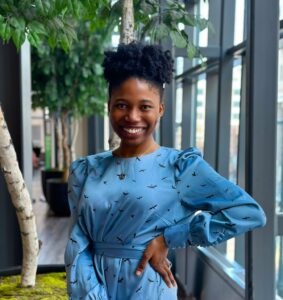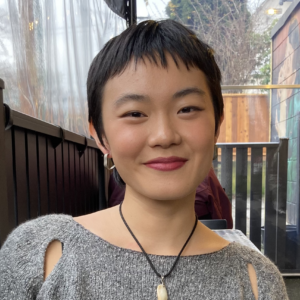In the third module of the Youth Policy Program (YPP), participants challenged their own thinking about holding power and creating change.
Andrea Reimer, a former three-term Vancouver city councillor, facilitated an immersive exercise about power and privilege.
“She put all of us into different breakout rooms and then told us to decide who was the most powerful in the room,” said program participant Toluwanimi Okunola, also known as Tolu.

Tolu said the exercise was initially uncomfortable.
“My initial reaction was ‘No thanks’,” said Tolu. “When we came back to the main session, we had to report on who was the most powerful person in our group.”
“We learned that other groups had different ideas of what power was. For example, someone had emigrated and started from scratch and now is doing well …that’s powerful,” she said.
Tolu said it was challenging because they weren’t given any standards to determine powerfulness.
“She [Andrea Reimer] didn’t give us any metrics, she just let us do that for ourselves. And I think that was part of the uncomfortableness of it, having to decide: Are we going to conform to what the majority of society says is what power is or are we going to decide for ourselves?”
Tolu said Andrea’s interpretation of the exercise was very impactful.
“She said it was less about whether we have power or not, it’s how we hold power. We all have power, it’s what we do with it, how we hold it, that matters.”
Program participant Oceania Chee, who uses they/them pronouns, was inspired by Aslam Bulbulia’s presentation, “Theory of Change.” Aslam is a community builder, facilitator and activist.

“One thing that really stuck with me is how colonial and white supremacist versions of change follow the structure of Newtonian physics, where there are set rules and axioms that you have to go by,” said Oceania.
“It’s very structured and specifically kind of rigid, whereas decolonial change is like quantum physics, which is, it shifts all the time. It’s very dynamic, it’s always fluid and can be multiple things at once,” they said.
Oceania said Aslam’s presentation gave them a way to look at the kinds of changes they want to be making in their own policy proposal. After the presentation, they asked him this question: How do you build trust in a group, such as in a non-profit that’s trying to make change?
They said his response was very thoughtful and empathetic.
“He had a really great answer where we kind of have to make the space for people to disagree and to make it a sharing of ideas and not this one person against the world,” they said.
Oceania also learned a lot about the technical side of budget cycles, especially for non-profits.
“I’m personally not super used to it. I’ve never really been in the nonprofit space so I think it was very instructive and illuminating to be able to hear just how much of it is having to deal with money.”
The fourth module will be in-person and the cohort will meet in Victoria to learn about the B.C. government and Indigenous governance! Follow their journey on Instagram.
